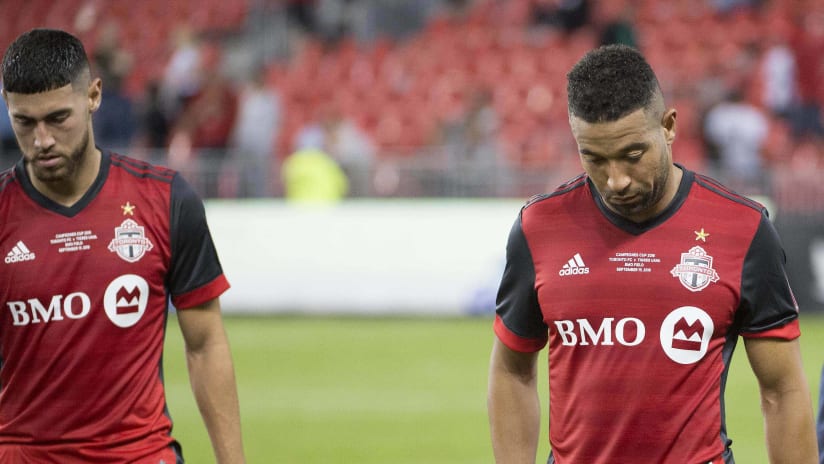TORONTO – 2018 has been a year of lessons for Toronto FC.
On the heels of a domestic treble-winning season in 2017, Toronto faced new challenges that led to them being unable to defend the Supporters' Shield and to missing the 2018 Audi MLS Cup Playoffs.
“It's important that we do an autopsy on this year,” said general manager Tim Bezbatchenko on Tuesday. “Looking at the last two years, how we were able to accomplish what we were able to and how it changed this season. There are reasons for it. We're going to take the next few weeks to continue to learn about what we did right, what we did wrong. There was a lot of both.”
Initial topics include approaches to the offseason and preseason, load management and injury avoidance, squad depth and rotation, scheduling, travel, and the pitch at BMO Field.
The overriding question, according to Bezbatchenko, is, “How can we compete in multiple competitions and contend? We did two of the three – Champions League and Canadian Championship, but we missed out on the third.”
That process begins in the offseason.
“Last year, because it ended so late, a lot of guys took it to just rest and recover,” explained head coach Greg Vanney. “But then we got into a tournament that was extremely challenging. The guys who came in fit were able get the most out of preseason and remained durable. [For those] who tried to use preseason to get fit, the start of the Champions League was difficult and costly.”
“Individually as players, coaches, management, we learned a lot about what we're going to have to deal with next year,” added Vanney. “How to approach in a better way.”
Vanney explained that the Champions League alters the traditional slow build to an MLS season, with six weeks of preseason and then two months of weekly matches. Instead, Toronto had just four weeks of preparation and then played 13 matches over those opening months.
“We'll talk to each guy, make sure they're prepared for what we will encounter [in preseason],” said Vanney. “Last year we did a lot of travel. We'll take a lot of that out: every time you lose two-three days of training.
“We went to Mexico in order to get them Mexican opponents and altitude, but when you go to 5,000 feet, the intensity at which you can train comes down because you're overloaded so fast. We'll keep our guys at sea level: more high intensity sessions to get that durability back.”
Durability, in particular, was an issue for TFC in 2018.
The focus on CCL “didn't factor in the ability to be durable during the 34-game regular season,” added Bezbatchenko. “This year we're going to make sure [preseason] does both, if that's possible.”
TFC has brought in Kitman Labs, a data and analysis company, to “work with us on how we approach training; [monitor] the load on players,” said TFC president Bill Manning. And will look to improve their starting caliber depth pool. “We have to be deeper,” stressed Manning. “We need to do a better job of rotating.”
No stone will be left unturned.
“It's looking at our schedule, looking at travel,” added Bezbatchenko to the growing list. “Looking at how to be mentally strong in a season where you are going to play 45-plus games.”
And then, there is the pitch at BMO Field itself, which was a challenge for both the home team and visiting sides this year. Manning called its state “a series of errors.”
With just months between the MLS Cup Final and CCL, Toronto opted to nurse the pitch through the winter in hope that the mature field could recover from the damage suffered. It did not, and when they re-laid the surface during the World Cup break, there wasn't the time required for it to settle properly, snowballing into a troubled state.
It was ripped up following the win over Atlanta United on Decision Day presented by AT&T – after the grounds crew played a rather entertaining game on it. A new surface will be laid and will have the offseason to set in roots ahead of the Champions League. Once mature, Toronto will bolster it with the SISGrass hybrid system.
Manning explained that TFC sent their groundskeeper to Europe to investigate the results, including Chelsea FC's Stamford Bridge. Lambeau Field, home of the Green Bay Packers, recently became the first to install the system in North America.
“It allows multiple competitions and will hold up much stronger during the course of a season, especially for weather like we get here,” detailed Manning. “If we're going to be playing Champions League games in February and playoff games in November, maybe even December, you need the strength of the root structure.”
“[It will] provide what will be one of the best surfaces in the world,” said Manning. “This year it was unfortunate that our field was sub-par for the majority of the year.”














